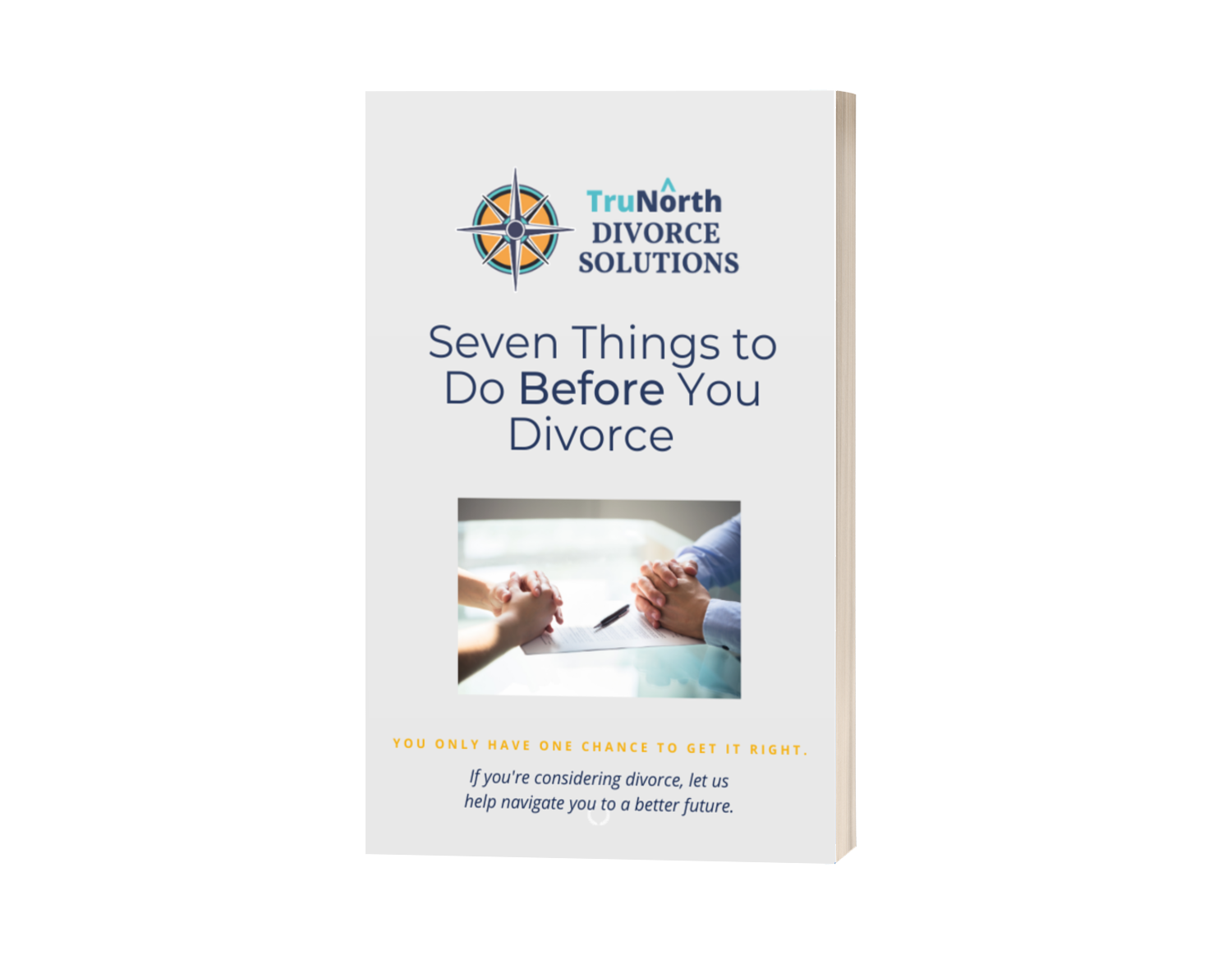SEVEN THINGS TO DO BEFORE YOU DIVORCE
Get Our FREE eBook!


You have several important decisions to make when you begin your divorce journey, including choosing the right divorce process. If you are considering mediation, the selection of the right divorce mediator is crucial for a successful mediation process. This article will help you understand the types of mediators, their styles, and important factors to consider when making your choice.
There are three main types of divorce mediators, each bringing different expertise to the table:
Ideally, look for a mediator who has knowledge in all these areas or consider building a team that covers these aspects.
Mediators typically use one of these styles:
Understanding these styles can help you choose a mediator whose approach aligns with your needs and preferences.
Dual mediation is an approach where two mediators work together to facilitate the divorce process. This method can offer several advantages:
While dual mediation can be highly effective, it’s important to note that it may be more expensive than working with a single mediator. When considering this option, weigh the potential benefits against the increased cost.
During your initial consultation, consider asking these questions:
Choosing the right divorce mediator is a personal decision that depends on your specific circumstances. Take the time to research and meet with potential mediators before making a decision. Remember, the goal is to find a mediator who can guide you through the process effectively, helping you reach a fair agreement while minimizing conflict and stress.
Consider scheduling initial consultations with a few mediators to get a sense of their style and approach. This will help you make an informed decision and choose a mediator who best fits your needs and situation.
And look for our upcoming article on the cost of divorce mediation!
Looking to explore your divorce options including mediation? Berni Stevens, an experienced mediator, divorce coach, and Certified Divorce Financial Analyst® (CDFA), supports clients in mediation, collaborative divorce, and litigation.
Schedule Your Complimentary Divorce Strategy Session Today!
You can read more divorce related articles, news and resources here. Don’t forget to follow along on social media for helpful divorce tips and resources!

High net worth divorces involving significant assets can be incredibly complex, but a Certified Divorce Financial Analyst (CDFA®) can make all the difference.
In high net worth divorces, intricate portfolios often include multiple properties, stocks, bonds, and other valuable assets. A CDFA® provides the expertise needed to make informed decisions regarding these assets, ensuring a fair distribution.
Tax implications play a crucial role in divorce settlements. A CDFA® assists in planning to minimize the overall tax burden on both parties. They can also conduct forensic analysis if there’s a suspicion of asset concealment, helping to uncover hidden financial details.
Mediation can save time and money. With a CDFA® acting as a neutral expert, both parties can better understand the financial implications of various proposals, leading to smoother negotiations and more equitable outcomes. If mediation isn’t an option, a CDFA® can work with your attorney as a consultant, providing expert testimony during the trial if needed.
Curious about how a CDFA® can support your divorce journey? Schedule Your Complimentary Divorce Strategy Session Today to learn how we can help you through this challenging time.
When you consider divorce, or if you know someone who is contemplating divorce, one of the biggest realities for those in the divorce process is the financial settlement and financial analysis post-divorce. Get the assistance of Berni Stevens, a Mediator, Certified Divorce Financial Analyst® (CDFA®), and divorce coach.
Berni provides step-by-step guidance on matters related to divorce. With a wide range of experience and expertise related to divorce issues, Berni will simplify the process and provide much-needed clarity in areas such as long-term tax consequences, asset, and debt analysis, dividing pension plans, continued health care coverage, stock option elections, protecting support with life insurance, and much more. She can also guide you through building an effective parenting plan, and getting your divorce processed through the court.

Couples with high net worth who have substantial and complex finances face several unique challenges when divorcing. Lawyers may be aware of the special challenges, but they don’t typically utilize the expertise available to deliver an optimal settlement agreement. This article will first address the challenges and issues inherent in high net worth divorces, followed by how working with a Certified Divorce Financial Analyst® (CDFA®) can increase the quality of the financial settlement by helping the spouses keep more of what’s theirs, avoiding mistakes, and identifying creative options so each spouse’s unique needs are met.
High net worth couples often have intricate financial portfolios including multiple properties, businesses, stocks, bonds, art collections, and other valuable assets. Dividing these equitably requires careful valuation and consideration of liquidity, tax implications, and future value. For instance, dividing a valuable art collection might involve not just current market value, but also potential appreciation and the personal attachment of each spouse.
The division of assets can trigger significant tax events. For example, selling a property to split its value could incur capital gains tax. Transferring retirement accounts or stock options may have tax consequences. Alimony payments have tax implications for both the payer and recipient. Careful planning with tax professionals is crucial to minimize the overall tax burden on both parties.
If one or both spouses own a business, determining its value can be highly complex. Factors like goodwill, intellectual property, and potential future earnings come into play. Multiple valuation methods might be used, such as asset-based, market-based, or income-based approaches. Disagreements over valuation methods can lead to prolonged disputes.
Some individuals might attempt to conceal assets to protect them from division. This could involve transferring assets to third parties, under-reporting income, or overstating debts. Forensic accountants may be needed to trace financial transactions, uncover offshore accounts, or identify undervalued assets.
Courts often aim to help both parties maintain a lifestyle like what they had during the marriage. This can be challenging when the lifestyle was extremely luxurious. Considerations might include housing costs, travel, education for children, and other high-end expenses. Determining what’s “reasonable” can be subjective and contentious.
High-profile couples often want to keep divorce details private to protect their reputation, business interests, or children. This might involve using alternative dispute resolution methods like mediation or collaborative divorce, filing documents under seal, or reaching non-disclosure agreements with all involved parties.
When assets are spread across multiple countries, questions of jurisdiction arise. Different countries have varying laws on asset division and spousal support. This can lead to “forum shopping,” where each spouse tries to file in the country most favorable to their interests. Enforcing judgments across borders can also be challenging.
While prenups are meant to simplify divorce proceedings, they can become a point of contention in high net worth cases. One party might challenge the agreement’s validity, claiming it was signed under duress or without full financial disclosure. The court’s interpretation of prenup clauses can significantly impact the final settlement.
Ensuring children maintain their standard of living often involves complex financial arrangements. This might include provisions for private schooling, extracurricular activities, travel, and future college expenses. Balancing these needs between two households while ensuring neither parent feels financially burdened can be challenging.
High net worth divorces often require a team of experts. This might include forensic accountants to trace assets and income, business valuators, real estate appraisers, tax specialists, and financial planners. Coordinating these experts and managing the information they provide adds another layer of complexity to the process.
The high stakes involved can intensify emotions. The potential for significant financial loss can lead to increased conflict and less willingness to compromise. The public nature of some high net worth divorces can add stress. Managing these emotions while making sound financial decisions is a significant challenge.
Due to their complexity, high net worth divorces often take longer to resolve and cost more in legal and professional fees. The process can take years if the case goes to trial. The expense of the divorce itself can become a significant financial consideration, potentially impacting the final settlement.
Each of these factors interplay’s with the others, creating a complex web of considerations that must be carefully navigated to achieve a fair and sustainable divorce settlement.
A Certified Divorce Financial Analyst (CDFA) can bring significant value to a high net worth divorce by providing specialized financial expertise. Here are the key benefits:
CDFAs use sophisticated software and analytical tools to create detailed financial models. These models can project each party’s financial situation 5, 10, or even 20 years into the future based on different settlement scenarios. They consider factors such as income growth, inflation rates, investment returns, and changes in expenses over time. This analysis helps clients understand the long-term consequences of their decisions, not just the immediate impact.
CDFAs have in-depth knowledge of tax laws related to divorce. They can advise on issues such as the tax implications of selling the family home, the most tax-efficient way to divide stock options or restricted stock units, and how to structure alimony to benefit both parties tax-wise. They might suggest strategies like using a Qualified Domestic Relations Order (QDRO) to divide retirement accounts without triggering early withdrawal penalties.
While CDFAs don’t typically perform valuations themselves, they play a crucial role in the valuation process. They can help identify which assets require professional valuation (like businesses, real estate, or complex investments) and which can be valued more simply. They can also interpret valuation reports, explaining their implications to clients and attorneys. For example, they might help a client understand how different valuation methods for a family business could impact the overall division of assets.
CDFAs are trained to spot financial irregularities that might indicate hidden assets. They might notice patterns in bank statements that suggest money is being diverted, identify suspicious business expenses that could be personal in nature, or recognize when reported income doesn’t align with the family’s lifestyle. They can then work with forensic accountants to investigate further and potentially uncover assets that should be included in the marital estate.
Dividing retirement assets in a high net worth divorce can be particularly complex. CDFAs can analyze the true value of different retirement accounts, considering factors like tax-deferred growth, required minimum distributions, and early withdrawal penalties. They can help clients understand the pros and cons of keeping different types of retirement assets and how these choices might impact their retirement lifestyle.
CDFAs create detailed post-divorce budgets that go beyond just listing current expenses. They consider how expenses might change over time (e.g., children’s education costs, healthcare needs as the parties age) and how income might fluctuate. This analysis helps ensure that any proposed settlement will allow both parties to maintain an appropriate lifestyle in the long term, not just immediately after the divorce.
CDFAs assess the insurance needs of both parties post-divorce. This includes evaluating whether existing life insurance policies are sufficient to secure alimony or child support payments, considering the need for disability insurance to protect income streams, and analyzing health insurance options. They might recommend strategies like maintaining a life insurance policy on an ex-spouse who is paying alimony or child support.
For divorces involving privately-owned businesses, CDFAs can provide valuable insights. They can help analyze how different settlement options (like buying out a spouse’s share of the business or ongoing profit-sharing arrangements) might impact the business’s cash flow, operations, and overall value. They can also help structure settlements that allow the business to continue operating successfully while fairly compensating the non-operating spouse.
CDFAs serve as financial educators for their clients. They can explain complex concepts like the time value of money, risk-adjusted returns, or the impact of inflation in understandable terms. This education empowers clients to make informed decisions and can help reduce anxiety about their financial future.
In mediation, a CDFA can serve as a neutral financial expert, helping both parties understand the implications of various settlement options. They can create financial models on the spot to show the long-term impact of different proposals, facilitating more productive negotiations.
If a case goes to trial, a CDFA can provide expert testimony on financial matters. They can explain complex financial concepts to the court, present analysis of different settlement scenarios, and offer professional opinions on what would constitute an equitable financial settlement.
Beyond the immediate divorce settlement, CDFAs can help clients plan for their financial future. This might include developing investment strategies appropriate for their risk tolerance and financial goals, planning for retirement with their new financial reality, and considering estate planning implications of the divorce.
Using specialized software, CDFAs can create detailed “what-if” scenarios. For example, they might model the financial impact of keeping the family home versus selling it, or compare the long-term effects of a lump-sum settlement versus ongoing support payments. This modeling allows clients to make decisions based on concrete projections rather than guesswork.
CDFAs can provide strategic advice on dividing debts. They consider factors like interest rates, tax deductibility of different types of debt, and each party’s ability to refinance. They might suggest strategies like using liquid assets to pay off high-interest debt before dividing the remaining assets, or structuring the division of debt to align with each party’s income and assets.
By providing this specialized financial expertise, a CDFA can help ensure that financial decisions in a high net worth divorce are made with a clear understanding of their short-term and long-term implications and identification of creative strategies. This can lead to more equitable settlements, reduce financial mistakes, optimize the settlement for taxes, and better meet the priorities of each spouse.
When you consider divorce, one of the biggest realities for those in the divorce process is the financial settlement and financial analysis post-divorce. Get the assistance of Berni Stevens, a Mediator and Certified Divorce Financial Analyst® (CDFA®.)
Berni provides step-by-step guidance on matters related to divorce. With a wide range of experience and expertise related to divorce issues. Berni will simplify the process and provide much-needed clarity in areas such as long-term tax consequences, asset, and debt analysis, dividing pension plans, continued health care coverage, stock option elections, protecting support with life insurance, and much more.
Schedule Your Complimentary Divorce Strategy Session Today!
Read More Divorce Related Articles you can read more divorce related articles, news and resources here. Don’t forget to follow along on social media for helpful divorce tips and resources!

This is the third of a three-part series on executive compensation. In our previous articles How Executive Compensation Impacts Divorce and How Executive Compensation is Divided in Divorce, we identified the prominent forms of executive compensation, discussed why they are important in divorce and what makes them so complicated, and how they are generally divided. The purpose of this article is to discuss some of the nuances of how the more common types of executive compensation are valued and divided in divorce
There are two types of options: incentive stock options (ISO’s) and non-qualified stock options (NSO’s). ISO’s are a type of compensation that can be granted only to employees (not to board members or consultants). They offer certain tax advantages under the U.S. tax code. Internal Revenue Code. NSO’s are the right to buy company stock at a predetermined price without tax advantages.
ISO’s and NSO’s are not taxed when granted, but the difference between the exercise price and the fair market value at exercise is taxable. As for ISO’s, the difference in exercise price and fair market value is considered a preference item for the Alternative Minimum Tax (meaning it is not subject to income tax but is included in the calculations for the Alternative Minimum Tax). For NSO’s, the difference is taxed at regular income rates, including Social Security and Medicare taxes. For both ISO’s and NSO’s, capital gains taxes are paid when the stocks are sold. The holding period for determining short-term versus long-term gain starts on the exercise date.
Note that several limitations on ISOs can affect taxes: 1) The value of ISOs that first become exercisable in any one year cannot exceed $100,000 per employee (based on the grant date value). Tax purposes treat any options exceeding this limit as non-qualified stock options (NSOs). 2) Employees who own more than 10% of the company’s stock cannot receive ISOs unless the exercise price is at least 110% of the fair market value on the grant date and the term of the option is no more than five years. 3) ISOs typically must be exercised within 10 years from the grant date, or five years for 10% shareholders. If terminated, employees must exercise ISOs within 3 months after termination. If terminated because of death or disability, they must be exercised within 1 year. ISOs can be transferred to the non-employee spouse upon death.
ISO’s are not transferable and most NSO’s are also not transferable from the employee spouse to the non-employee spouse. Those which are transferable can be transferred upon vesting to the non-employee spouse and upon exercise the non-employee spouse pays taxes based on their own tax rates. Those not transferable can be exercised by the employee spouse after vesting and the after-tax value based on the employee’s marginal tax rate can be paid to the non-employee spouse.
When it is possible to transfer NSO’s and they are part of a qualified retirement plan, a QDRO will be required to divide the assets between spouses without triggering immediate tax consequences for the recipient spouse.
For NSO’s and ISO’s, the employee spouse can keep all his/her options by valuing the options and offsetting with other marital assets. However, option valuation is not straightforward.
Easiest to comprehend is the option’s intrinsic value, which is the difference between the value of the stock at separation and its strike price (the value at which the stock can be purchased at exercise). Intrinsic value, while easy to comprehend, does not consider future price volatility or dividend rates.
The Black-Scholes method is the most widely used method for calculating option values. It assumes the employee does not exercise the option until the last day possible and it accounts for future price volatility and dividends.
Last the Binomial Method take the Black-Scholes method and creates a tree of possible option values as well as early exercise. It tends to produce a slightly lower valuation than Black-Scholes. It is not widely used nor understood.
Shares granted to executives that are subject to certain restrictions, such as vesting periods or performance conditions. Once the restrictions are lifted, the executive fully owns the stock.
Taxed as ordinary income at vesting (unless an 83(b) election is made), with capital gains tax on any subsequent appreciation.
Once vested, restricted stock can be transferred in divorce. If not yet vested, the employee spouse can transfer the stock upon vesting but the taxes will be paid by the employee spouse. Thus, it is important to account for the marginal taxes that will be paid upon vesting in their value at transfer.
It is sometimes desirable to value the non-vested restricted stock at the time of divorce rather than wait for division at vesting. In this case, valuation will depend on the projected future stock price of the company. There are two methods for valuing restricted stock.
RSUs are a promise to deliver shares of stock (or the cash equivalent) at a future date, once certain conditions (like vesting) are met. They do not represent actual shares upon grant. Once vested, the RSU’s convert into actual shares. Dividends may be paid on unvested units and some plans accrue dividends and pay at vesting.
Employees are taxed when the RSUs vest and convert into actual shares. The fair market value of the shares at vesting is considered taxable income. Unlike restricted stock, there is no 83(b) election available for RSUs.
RSU’s are generally not transferrable. The employee spouse will have taxes withheld at the time of vesting. There is precedent that allows the employee spouse to issue a 1099 to the non-employee spouse. This is so that the non-employee spouse can later pay taxes at his/her rate. It is based on a number of cases where taxpayers obtained a private letter ruling from the IRS that approves this practice. However, exercise caution, as the practice may not hold up in an audit. Also, if an employee spouse issues a 1099 for the amount of stock transferred, the employee spouse must still pay the social security and Medicare taxes. They should be compensated for that by the non-employee spouse.
Same as for restricted stock.
Shares granted based on the achievement of specific performance targets. These targets can be financial metrics, such as earnings per share (EPS), or non-financial metrics, such as customer satisfaction scores.
Same as with restricted stock units.
Same as with restricted stock units.
Similar to restricted stock units but vesting is based on meeting performance standards, not the passage of time.
Same as with restricted stock units.
Same as with restricted stock units.
Earnings that are set aside to be paid out at a later date.
Taxed as ordinary income in the year of payment.
You must calculate the present value of future payments, and then either offset the value or defer the distribution to the non-employee spouse until the payments go to the employee spouse. In an offset, and in cases where you consider after-tax asset values, you should adjust the present value based on the non-employee spouse’s expected marginal tax rate at the time of distribution.
Executive compensation can represent a substantial asset in divorce. Future executive compensation can also be a sizeable amount of income on which to base support. Thus, it is crucial to understand whether various compensation types exist. When they can be transferred, how they will be taxed at transfer. And how they might be valued if they are not transferable or if waiting for a transfer is undesirable. Adding a Certified Divorce Financial Analyst® that is trained and experienced in identifying and valuing executive compensation to the divorce team is critical. Whether they work directly with a client as a mediator or consultant or in conjunction with the client’s attorney.
When you consider divorce, one of the biggest realities for those in the divorce process is the financial settlement and financial analysis post-divorce. Get the assistance of Berni Stevens, a Mediator and Certified Divorce Financial Analyst® (CDFA®.)
Berni provides step-by-step guidance on matters related to divorce. With a wide range of experience and expertise related to divorce issues. Berni will simplify the process and provide much-needed clarity in areas such as long-term tax consequences, asset, and debt analysis, dividing pension plans, continued health care coverage, stock option elections, protecting support with life insurance, and much more.
You can read more divorce related articles, news and resources here. Don’t forget to follow along on social media for helpful divorce tips and resources!

In our previous article, “How Executive Compensation Impacts Divorce,” we presented the types of executive compensation that should be considered for purposes of marital property division, as well as future income that should be included for support calculations. This article will examine the basics of dividing executive compensation. We begin by identifying several key aspects of executive compensation in divorce.
In most cases involving divorce, we must first determine to what extent the compensation is marital and subject to division. In all cases, if the compensation was awarded and vested during the marriage, they are 100% marital. If awarded but not vested, we must first determine the extent the award is based on past service vs. future performance. To the degree based on future performance, that portion would be considered separate property. To the extent that there are no plan-specific rules regarding the division of benefits, coverture fractions are used to determine the percent marital.
Coverture fractions based on past performance are based on the Hug formula. The numerator (marital service credit) represents the total number of years or months during which the retirement benefits were earned or accrued while the spouses were married. This includes the period from the date of marriage to the date of separation or divorce filing, whichever is applicable. The denominator (total service credit) represents the total number of years or months that the spouse worked or accumulated service credit that counts towards the retirement benefit. Up to the present date or retirement date. Calculate the marital coverture fraction by dividing the numerator (years of marital service credit) by the denominator (total years of service credit).
Coverture fractions based on future performance are based on the Nelson formula. The numerator (period of marital service) represents the period during which the spouse earned or accrued retirement benefits while the marriage was intact. This typically starts from the date of marriage to the date of separation or divorce filing, depending on state laws. The denominator (total period of service) represents the total period during which the spouse worked or accumulated service credit that counts towards the retirement benefit up to the present date or anticipated retirement date. Calculate the marital coverture fraction by dividing the numerator (period of marital service) by the denominator (total period of service).
Most executive compensation cannot transfer directly to the non-employee spouse. Even if it can be, it may not be advantageous to transfer it at the time of vesting or payment. In these cases, we need to be able to provide a value for the portion earned during the marriage so that the employee-spouse can keep the compensation while the non-employee spouse receives other assets to compensate. Valuation, however, is not always a straightforward exercise.
When transferring to a non-employee spouse, we need to adjust for the taxes paid at the time of vesting or exercise. Depending on the plan, the recipient’s marginal tax rate applies to some transfers when exercised. Only the employee spouse can exercise others, using the employee spouse’s marginal tax rate at vesting or exercise.
Attorneys may subpoena the employee spouse’s company or the employee spouse can provide documents that are necessary to determine if the executive compensation is based on past or future performance, granting conditions and vesting schedules. Request the following documents:
In our next article, we will look at some of the nuances of handling executive compensation across the more common types of executive compensation.
When you consider divorce, one of the biggest realities for those in the divorce process is the financial settlement and financial analysis post-divorce. Get the assistance of Berni Stevens, a Mediator and Certified Divorce Financial Analyst® (CDFA®.)
Berni provides step-by-step guidance on matters related to divorce. With a wide range of experience and expertise related to divorce issues. Berni will simplify the process and provide much-needed clarity in areas such as long-term tax consequences, asset, and debt analysis, dividing pension plans, continued health care coverage, stock option elections, protecting support with life insurance, and much more.
You can read more divorce related articles, news and resources here. Don’t forget to follow along on social media for helpful divorce tips and resources!